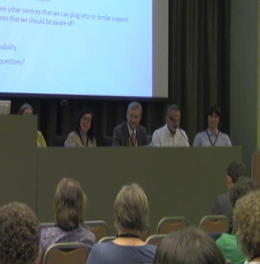News Story
Strong visibility of KMi’s work at Open Repositories 2014
Friday 11 Jul 2014
KMi work received high visibility at the 9th International Conference on Open Repositories (OR2014) in Helsinki, Finland especially due to the KMi’s CORE project being mentioned on numerous occasions in the talks of non-OU conference participants. OR 2014 is the main conference in the field of open science and open access repositories and attracted this year over 400 attendees. Additionally, a large number of participants attended virtually as sessions were also broadcasted online.
KMi’s Petr Knoth representing the CORE and FOSTER projects delivered 1 full paper presentation, 2 posters and was also invited to sit on one panel. However, the highlight of the conference from KMi’s perspective, was certainly the fact that CORE was discussed in presentations of non-KMi people, sometime even as a key enabling component.
The first day of the conference hosted the Open Access Button workshop. OA Button makes individual moments of injustice and frustration in accessing research outputs visible to the world. The workshop chaired by Penny Andrews of Sheffield University discussed the technical issues the implementation of OA Button faced and highlighted the use of CORE as an important component for discovering open access copies of research articles on the Internet.
The second day of the conference featured a presentation by Martin Klein of Los Alamos National Laboratory about the HyberActive project. HyberActive provides a pro-active service to archive web references from scholarly articles. A KMi visiting researcher, Dominika Koroncziova and Petr Knoth helped the team in Los Alamos to integrate HyberActive with CORE and set up a demo for OR 2014. During the presentation, Martin Klein showed how CORE sends notifications about new articles and the references extracted from full-texts to their archiving service and described how this simplifies efforts to research data, code and publications management and preservation.
In the afternoon, Petr Knoth gave a full-paper presentation titled "My repository is being aggregated: a blessing or a curse?" authored by Petr in collaboration with Lucas Anastasiou and Samuel Pearce. Petr explained how repositories and aggregators need to create a mutually beneficial ecosystem in which usage statistics are shared, while preserving the distributed and open nature of the overall architecture.
The next session was a panel organised by the Jisc Repositories Shared Services Project featuring presentations and discussion from a set of services and projects (RIOXX, V4OA projects, RJB, IRUS-UK, SHERPA Services and CORE), which are seen as critical for the UK research infrastructure. One representative from each of these projects was invited to sit on the panel featuring Jisc, the two Jisc centres of excellence EDINA and MIMAS, University of Nottingham and KMi, the Open University. This was a lively 75 minute session attracting a good number of questions from the audience.
The long day continued with a poster on the new FOSTER project presented by Eloy Rodriguez and Petr Knoth and a poster on the Jisc RSSP project mentioning CORE and presented by Jisc with the assistance of the service providers. A few posters, such as the London School of Economics poster also mentioned CORE. The last day of the conference has seen a presentation from Richard Jones of Cottage Labs demonstrating the outcomes of the Open Access Repository Registry project funded by Jisc in in which KMi participates. The presentation showed the exchange of data between the new registry and CORE.
Overall, this was a very busy, but rewarding week.
Latest News
KMi at the Palace of Westminster: Exploring Blockchain for Society and Economy
OUAnalyse at the Digital Ethics Summit 2025: Advancing Responsible AI in Education

